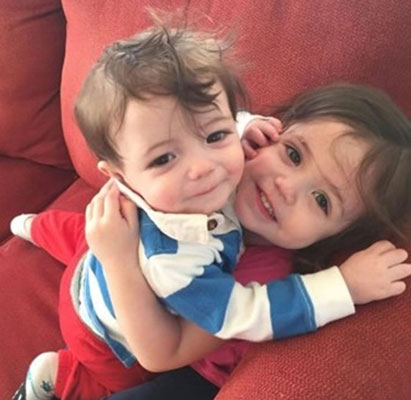By: Meaghann Weaver, MD, PhD, MPH, HEC-C & Arwa Nasir, MBBS, MSc, MPH, FAAP
The end of a child's life leaves a painful void in the hearts of everyone who loves them. Regardless of the child's age or the cause of death, the grief that follows can make daily life feel unbearably hard.
If you've lost a child or teen, you understand how tough it is to make decisions and handle the many tasks in front of you while you're still mourning. Knowing you are not alone can be a huge help. This is why doctors who treat children and teens are focusing on the needs of grieving parents, caregivers and family members.
Read on for insights that may help you cope with what may be the greatest loss your family will ever face.
Feelings you might experience with the loss of a child
When an infant, child or teen passes, love and loss come together in a deeply painful way. While every person grieves in their own way, these are some of the emotions that parents, grandparents, siblings and other family members often feel.
Crying, sadness and low moods
Restless sleep that leaves you feeling tired the next day
Not wanting to eat, or eating a lot more than usual
Flash anger that seems to come out of nowhere
Fights that break out when grief causes you to criticize, attack or blame others
Guilt that your child was taken, but you're still alive
Loneliness and isolation, even if you spend time with people throughout the day
Clinging to your other children and fearing for their health and safety
The feeling that your life will never be the same again
Grief can also cause
physical pain that makes your body ache all over.
Anxiety, depression and even
suicidal thoughts can happen while you're mourning a lost child. Maybe this is why so many studies show that the health of family members tends to suffer when a young person dies.
Why grief doesn't move in a straight line
In the 1960s, a
well-known psychiatrist published a book based on their work with people and families facing death. They described
5 stages of grief that they believed people usually moved through after losing a loved one. Over time, their theory was taken to mean that almost everyone would pass through the same process before making peace with their loss.
Since then, we have learned that grief doesn't happen that way. It might move in fits and starts, with some days, weeks or months feeling easier and others filled with sadness, numbness or despair. This random, zig-zag pattern of mourning might last for weeks, months or years—and it is completely different for everyone.
If you're not passing through the shock, anger, denial, bargaining and acceptance that others have told you about, don't worry. No one can tell you how to grieve—and no one can say how long it should last. Realizing you have a right to all your feelings, even the worst ones, is an important step along the road to healing.
How and when your child died may influence how you feel
Sometimes, babies are born with serious health issues that end their lives within months. Older children may live with a chronic illness for years, but pass away when treatments can't save them. Violence, car wrecks and substance use may claim other lives, and sadly, some young people die by
suicide.
It's only natural that the situation surrounding your child's death might shape how you feel. Having watched a child struggle with long-term illness, parents and other family members may know that death is near. But the loss may hit much harder than expected. The truth is, we're never prepared for this kind of pain. It's not fair to expect that of ourselves or anyone else.
Sudden death, like the loss of a baby to
SIDS or a drowning, can trigger shock, rage and disbelief in those who survive. Guilt and blame may mix with feelings of grief that won't let go. The suicide of a child or teen can be very hard to understand, since many people see childhood as a time of joy and promise.
Parents, siblings and others may search their souls for reasons, but come up empty—which makes it even harder to get through the day.
Loss of a Sibling Through a Child's Eyes
By: Erin Bowen, MD
 When my daughter, Tessa, was 3 years old, a passing fire truck captured her attention. She didn't comment on its spinning lights or blaring siren, like young children often do.
When my daughter, Tessa, was 3 years old, a passing fire truck captured her attention. She didn't comment on its spinning lights or blaring siren, like young children often do.
"There's the truck that takes kids to heaven," Tessa said.
In 2016, our healthy son Conor inexplicably died in his sleep. He was 17 months old. In addition to our own mourning, we have had to manage the grief and questions of Tessa. She suddenly and unexpectedly lost her younger brother, her best friend, her constant companion. How could we answer her questions when no one could answer ours? How could we make her understand what our adult brains could not comprehend?
When a child dies, siblings are sometimes referred to as the "forgotten mourners." They are left to grieve their sibling while also experiencing what feels like the loss of their parents as they mourn. Siblings may experience a wide range of emotions, varying from sadness to anger and even seeming indifference.
As children get older and pass through different developmental phases, they may reprocess their grief and it may appear as if they are re-living their loss. We have experienced this first-hand with Tessa. As a 3-year-old, she was most preoccupied with where Conor had gone and why we couldn't bring him back.
By age 5, her questions became more abstract and detailed. Did he want to leave us? Will her younger sister Isabelle die? If we didn't know Conor was going to die, how can we be sure she and Isabelle will not?
One of the best ways for us to handle Tessa's questions was to ask other parents who had navigated this path. At a retreat for families affected by Sudden Unexplained Death in Childhood (SUDC), we saw the power of connecting siblings who had a shared experience of loss. We soon discovered that there were no "right" answers, but there was comfort in talking with other families.
I remember someone telling us that Tessa would be too young to remember her loss. This felt like a stab through the heart. Our worst fear was that she would forget Conor. While we wish we could erase her pain, we would never want her to forget her brother and their special bond. The intense heartbreak of losing your child and being left without answers is compounded as you watch your surviving children grieve.
However, in watching Tessa grieve, we also see great love. Shortly after Conor died, we saw the most beautiful sunset and Tessa told us Conor had painted the sky pink for us. Sunsets have now become a special manifestation of their everlasting connection.
Because Conor was always so full of love, we also honor his memory through acts of kindness in his name. We call these Kisses for Conor. This has been a meaningful way for Conor's siblings to channel their grief. It has also helped them realize that grief and joy can co-exist.
Erin Bowen is a pediatrician in Orange, CT and Vice President of the SUDC Foundation. An earlier version of this article appeared in the "AAP Voices" bog.
Grief is difficult, but there are things that can help
Let your feelings flow. There's no way you can get through this without losing control of your emotions from time to time. You may spend whole days crying, feeling guilty or wondering if life has any meaning at all. Knowing these feelings are natural may help you avoid bottling them up, which can be harmful to your health.
Expect people to say and do awkward things. Friends, neighbors and co-workers may not know what helps and what hurts when someone has lost a child. They may go silent and start avoiding you, or smother you with casseroles and offers of household help (very thoughtful, but maybe overwhelming). Some will say things meant to comfort you that actually make you feel furious, hurt and alone. Be ready to ignore these comments without guilt. It's not your job to help other people feel better, so don't take it on.
Accept help, but feel free to set boundaries. It won't help you to soldier on, trying to keep the same work, home, family and community schedule as before. Give yourself a break by letting others support you. This might mean letting friends and neighbors get groceries, water the lawn or take your other kids to and from school. It might mean taking all the sick days you're owed – even accepting PTO days donated by your work friends without shame or guilt. At the same time, if handling a few simple chores every day makes you feel better, say so. Don't feel you need to feed or care for people who stop to talk if you'd rather be alone.
Keep an eye on your own health. Grief can threaten your well-being at nearly every level of life. It's smart to see your primary care doctor often, being honest about how you're feeling and mapping out a treatment plan if you are losing sleep, feeling depressed or experiencing other symptoms. Put a simple
self-care routine together while letting yourself off the hook if you can't always follow it.
How to support your other children after sibling loss
Families with more than one child may find it even more difficult to manage their grief. If this is the first death your kids have experienced, they may struggle to understand what happened and why they feel so bad.
A child's age has a lot to do with the way they react when a sibling dies. Though it may be tempting to shield toddlers and young kids from basic truths, there are
4 things child health experts say you must be clear about to help them deal more effectively with losing their sibling.
Death is final. Their loved one will not come back, even though they may wish for that—or feel angry that it can't happen.
Their sibling is not suffering. Knowing that all life processes end when someone dies will protect your kids from the concern that they're cold, hungry or in pain.
Everything that lives will die someday. If kids don't understand this, they might wonder if they—or even their sibling—did something wrong. This can lead to terrible guilt and shame.
People die when their bodies stop working. If your kids know that their sibling's heart stopped or their bones broke in ways that couldn't heal, they will be better prepared to accept what happened. Simple, age-appropriate explanations can start with the fact that people of all ages, even kids, can and do die. This protects kids from imagining other causes, leaving them vulnerable to self-blame and fear.
These suggestions from the Coalition to Help Grieving Students offer more insights to help you support a child or teen who is mourning the loss of a sibling.
How pediatricians can help your family deal with grief
Pediatricians are doctors who dedicate themselves to the care of babies, children and teens. Even though your child is gone now, you and your other family members are here—and you deserve caring, compassionate support in dealing with your loss.
The American Academy of Pediatrics (AAP) has shared
10 recommendations with its members that point to ways they can help grieving families. These suggestions can help you understand what kinds of support your child's doctor can offer you and your other children.
The AAP recommends that all pediatricians:
Take time to listen to grieving parents and families and provide compassionate support.
See each family's unique needs, which will be based on the structure of the family and their feelings about death and dying.
Find out about the family's cultural and religious traditions around death so you can support them from a place of understanding.
Consider learning more about
cultural humility, sensitivity and implicit bias to address any views that might cloud your understanding of what the family needs.
Realize that you must fully acknowledge the child's death to help the family heal. Visit children who are sick or hurt and approaching death and talk with their families. After a child dies, reach out to parents and caregivers to see how they're doing and offer support.
Find out how you can support the child's siblings, especially if they are your patients.
Learn about community or online grief groups that can help parents, siblings and other family members and share these details with the family.
Families may struggle even more when crib death, a car crash, a shooting, drug overdose, suicide or other sudden event claims the life of a beloved child. Seek out the specialized resources the family might need.
Regardless of how the child died, offer to help family members find counseling or therapy to help them cope.
Keep in mind that grief may continue for a long time. Let the family know this is perfectly all right. There is no timetable that's right and no magic cure for the pain. Emphasize that, little by little, life will take on a new rhythm and meaning for them. Remind them you'll be there for them each step of the way.
More information
About Dr. Weaver
 Meaghann Weaver, MD, PhD, MPH, HEC-C serves as Lead Regional Ethicist for a federal agency. She previously served as a Pediatric Palliative Care Division Chief. Meaghann Weaver, MD, PhD, MPH, HEC-C serves as Lead Regional Ethicist for a federal agency. She previously served as a Pediatric Palliative Care Division Chief.
|
About Dr. Nasir
 Arwa Nasir, MBBS, MSc, MPH. FAAP, is a Professor of Pediatrics at the University of Nebraska Medical Center and Chair of the AAP Committee on the Psychosocial Aspects of Child and Family Health. Arwa Nasir, MBBS, MSc, MPH. FAAP, is a Professor of Pediatrics at the University of Nebraska Medical Center and Chair of the AAP Committee on the Psychosocial Aspects of Child and Family Health.
|